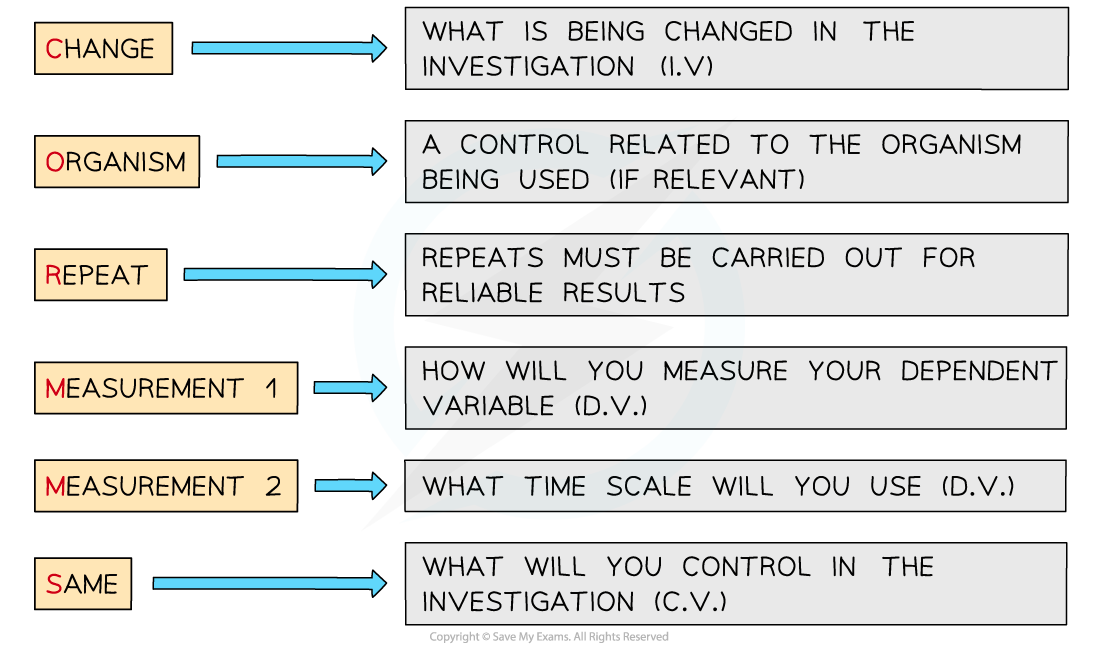Practical: Conditions for Germination (Edexcel IGCSE Biology: Double Science)
Revision Note

Author
LáraExpertise
Biology Lead
Practical: Conditions for Germination
- Germination is the start of growth in the seed
- Three factors are required for successful germination:
- Water - allows the seed to swell up, which causes the seed coat (testa) to burst, allowing the growing embryo plant to exit the seed. Water also allows the enzymes in the embryo to start working so that growth can occur (increases metabolic activity)
- Oxygen - required for respiration, so that energy can be released for germination
- Warmth - germination improves as temperature rises (up to a certain point) as the reactions which take place are controlled by enzymes, which cannot function effectively when temperatures are too low
- As carbon dioxide is not necessary for germination but also does not inhibit it, it makes no difference whether it is present or not
Apparatus
- Test tubes
- Test tube holder
- Cress seeds
- Cotton wool
- Fridge
Method
- Set up 4 test tubes, with each containing 10 cress seeds on cotton wool
- Label the test tubes A, B, C and D
- For test tube A, leave the cotton wool dry
- For test tube B, add enough water to the cotton wool so that it becomes moist
- For test tube C, add enough water to cover the cotton wool and seeds, then carefully add a layer of oil on top of the water
- For test tube D, add enough water to the cotton wool so that it becomes moist
- Leave tubes A, B and C at room temperature or incubated at a specific temperature (e.g. 20°C)
- Place tube D in a fridge (approximately 4°C)
- Leave all tubes for a set period of time (e.g. 3 - 5 days)
- Ensure the cotton wool in tubes B and D remains moist throughout this time by adding more drops of water if required
- Compare the results and see which tube has the greatest number of germinated seeds

Conditions required for germination: how to set up the experiment
Results and Analysis
- The test tubes are set up so that each of the factors required for germination (water, oxygen and warmth) can be tested, by selectively removing each in turn
- In test tube A, water is removed
- Test tube B is the control tube, where all factors are present
- In test tube C, oxygen is removed (oxygen cannot pass through the oil and water layers on top of the seeds)
- In test tube D, warmth is removed
- As germination cannot occur if the conditions are not right (i.e. if even one of the three factors required is absent), it would be expected that only the seeds in the control tube will germinate
Conditions Required for Germination: Example Results Table

Applying CORMS to practical work
- When working with practical investigations, remember to consider your CORMS evaluation

CORMS evaluation
- In this investigation, your evaluation should look something like this:
- C - We are changing the abiotic conditions in which the seeds are germinating
- O - The cress seeds will all be taken from the same parent plant (or at least from the same species of cress plant)
- R - We will repeat the investigation several times to ensure our results are reliable
- M1 - We will record how many seeds in each test tube germinate
- M2 - ...after a set time period (e.g. 3 days)
- S - We will control the temperature for tubes A, B and C. We will also control the type of water used (i.e. sterile water, which is made by first boiling then cooling water)

You've read 0 of your 0 free revision notes
Get unlimited access
to absolutely everything:
- Downloadable PDFs
- Unlimited Revision Notes
- Topic Questions
- Past Papers
- Model Answers
- Videos (Maths and Science)
Did this page help you?